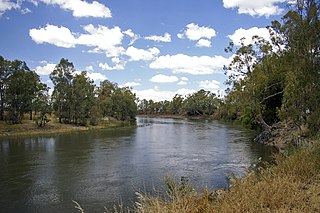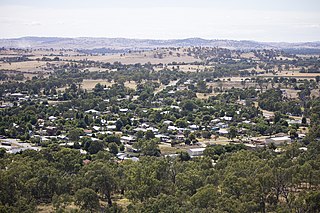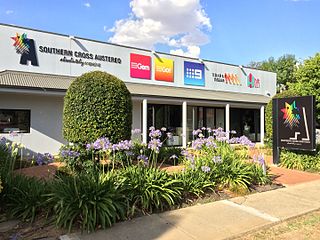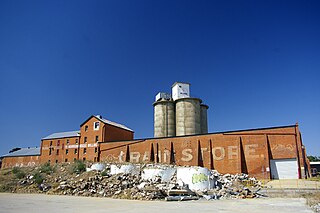
The Murrumbidgee River is a major tributary of the Murray River within the Murray–Darling basin and the second longest river in Australia. It flows through the Australian state of New South Wales and the Australian Capital Territory, descending 1,500 metres (4,900 ft) over 1,485 kilometres (923 mi), generally in a west-northwesterly direction from the foot of Peppercorn Hill in the Fiery Range of the Snowy Mountains towards its confluence with the Murray River near Boundary Bend.

Wagga Wagga is a major regional city in the Riverina region of New South Wales, Australia. Straddling the Murrumbidgee River, with an urban population of more than 56,000 as of June 2018, Wagga Wagga is the state's largest inland city, and is an important agricultural, military, and transport hub of Australia. The ninth largest inland city in Australia, Wagga Wagga is located midway between the two largest cities in Australia—Sydney and Melbourne—and is the major regional centre for the Riverina and South West Slopes regions.

The Olympic Highway is a rural road in the central western and south-eastern Riverina regions of New South Wales, Australia. The 318-kilometre (198 mi) highway services rural communities and links the Hume Highway with the Mid-Western Highway and provides part of an alternate road link between Sydney and Albury via Bathurst and Cowra as well as servicing Wagga Wagga, linking with the Sturt Highway.

St John of God Geelong Hospital is a 284-bed hospital providing inpatient and outpatient care in the Barwon and south-west regions of Victoria.

Bomen is a northern suburb of Wagga Wagga in southern New South Wales, Australia. The suburb is dominated by industrial enterprises including Cargill Beef, Watties, the Wagga Wagga Livestock Marketing Centre (saleyards). The suburb is also home to Wagga Wagga's secondary railway station on the Main Southern line, when the line waited for the construction of a bridge over the Murrumbidgee River. New streets in Bomen are to be named after sheep and cattle breeds.

Chase Farm Hospital is a hospital in The Ridgeway, in Gordon Hill, Enfield, run by the Royal Free London NHS Foundation Trust.
Lismore Base Hospital is a major public teaching hospital in the Northern Rivers region of New South Wales, Australia, located in the city of Lismore. It has approximately 260 beds, and serves as the primary hospital and recognised trauma centre for the Northern New South Wales Local Health District. Due to its size and location, the hospital also serves as a rural teaching hospital for many universities based in metropolitan New South Wales and Queensland. Its primary referral area consists of the Clarence and Richmond valleys, which has a population of approximately 180,000 people.

Ashmont, known originally as "J.J. Salmon's Estate" is a south-western suburb of Wagga Wagga, New South Wales, Australia. The suburb is named after the Salmon family's original homestead that was located where the suburb now stands.

North Wagga Wagga is an inner northern suburb of Wagga Wagga, New South Wales, Australia, located on the floodplain of the Murrumbidgee River, directly across from the city's Central Business District. North Wagga is one of Wagga's oldest suburbs, being settled at approximately the same time as Wagga. Two pubs are located within North Wagga - The Black Swan Hotel and the Palm and Pawn Hotel, as well as a public school, a public hall, a football/cricket ground and a scattering of business and churches.

Triple M Riverina is an Australian radio station which transmits on 1152 kHz on the AM band. It is licensed to the city of Wagga Wagga, New South Wales. The station is the first radio station to have a radio receiver built in regional New South Wales and was originally owned by a husband and wife team, the late Eric and Nan Roberts, who were both formerly school teachers in Narrandera. It officially commenced broadcasts from the former Hardys' Building in Fitzmaurice Street overlooking the Wollundry Lagoon, broadcasting on the Oura Road Transmitter site with 2,000 watts on 29 June 1932 and operated between 6.00 am and 11.00 pm. In 1995 2WZD (FM93) began broadcasting.

The Daily Advertiser is the regional newspaper which services Wagga Wagga, New South Wales Australia and much of the surrounding region. It is published Monday to Friday but also appears as a sister publication called The Weekend Advertiser on Saturdays. The paper reaches about 31,000 people during its Monday to Friday printing, equating to 85% of all people aged over 14 that live in the paper's main coverage area.

Murrumbidgee Co-operative Milling was built in 1890 in Wagga Wagga, New South Wales. After the Co-operative closed its operation in the 1980s the site was sold in 1987 to Goodman Fielder, operating for approximately a decade before ceasing its operation in December 2000. The Milling Co-operative was the second largest flour milling company in New South Wales outside Sydney.

Calvary Hospital, originally Lewisham Hospital, is a private hospital founded by Sisters of the Little Company of Mary in 1926 and built to a design by architect William Monks. It is located in Wagga Wagga, New South Wales, Australia.

St. Paul's Hospital is an acute care hospital located in downtown Vancouver, British Columbia, Canada. It is the oldest of the seven health care facilities operated by Providence Health Care, a Roman Catholic faith-based care provider. St. Paul's is open to patients regardless of their faith and is home to many medical and surgical programs, including cardiac services and kidney care including an advanced structural heart disease program. It is also the home of the Pacific Adult Congenital Heart Disease unit. It is one of the teaching hospitals of the University of British Columbia Faculty of Medicine. Approximately 4000 people work at St Paul's Hospital.
Alan Robert Lindsay "Lin" Gordon was an Australian politician. He was the Labor member for Murrumbidgee in the New South Wales Legislative Assembly from 1970 to 1984. He was Minister for Conservation and Water Resources from 1976 to 1981, Minister for Local Government and Lands from 1981 to 1984, and Minister for Lands and Ports for a few months in 1984.

Blackberry Hill Hospital is an NHS psychiatric hospital in Fishponds, Bristol, England, specialising in forensic mental health services, operated by the Avon and Wiltshire Mental Health Partnership NHS Trust. The hospital also offers drug and alcohol rehabilitation inpatient services, and is the base for a number of community mental health teams.
Healthcare in the city of Bristol, England and the surrounding area is largely provided by the National Health Service (NHS), through the Bristol, North Somerset and South Gloucestershire clinical commissioning group. Facilities include a large teaching hospital – Bristol Royal Infirmary – which offers nationally commissioned specialist cardiac, cancer and children's services from its city-centre campus to patients in the southwest of England and beyond.

St John of God Midland Public and Private Hospitals is a health care facility in Midland, Western Australia which opened in November 2015.
Goulburn Base Hospital is a public district hospital located in the city of Goulburn, New South Wales in Australia. The hospital is situated on Goldsmith Street, approximately 1 km (0.62 mi) from the Central Business District. The hospital is operated by Southern NSW Local Health District and serves as a regional referral facility providing a range of general, surgical and some specialist services. It is a teaching hospital affiliated with the Australian National University, based in Canberra.
Whyman McLean was an Australian Aboriginal man, a religious missionary who later served as an Aboriginal tracker in the New South Wales Police Force for thirty years until his retirement in 1925.
















